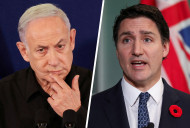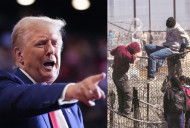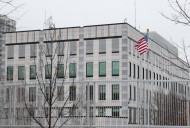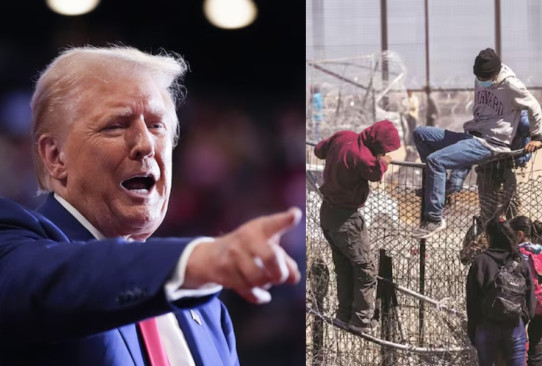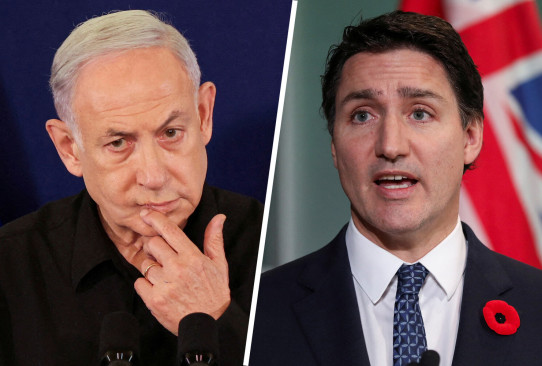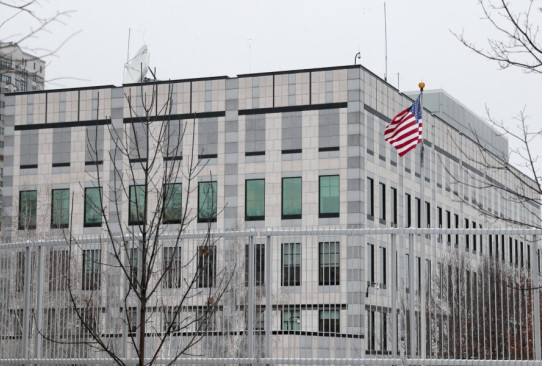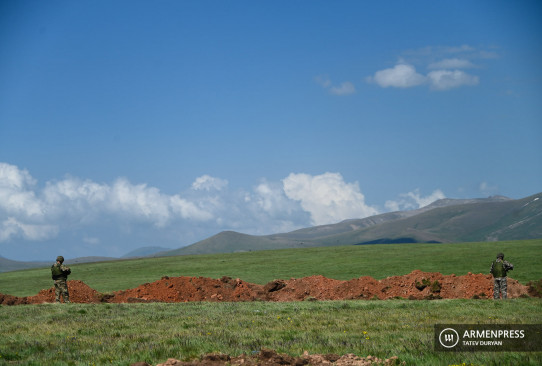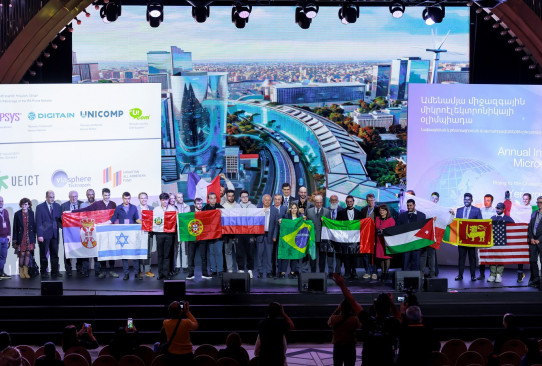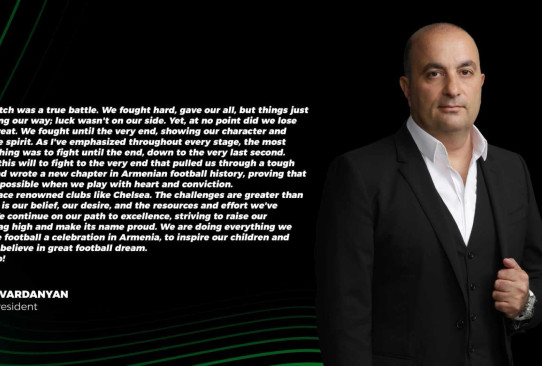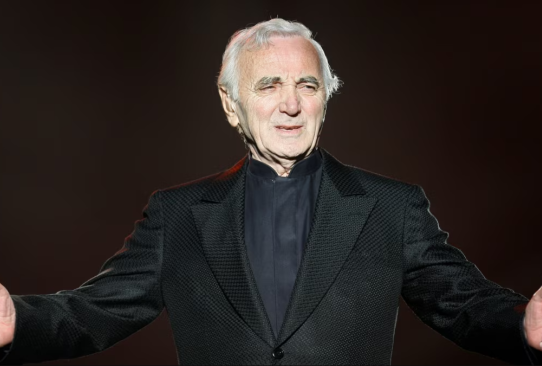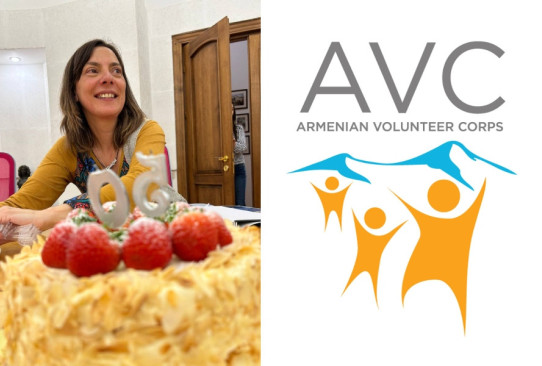New election monitoring technology puts very good safeguards against fraud – Richard Mills
In his recent interview with Tert.am, US Ambassador to Armenia Richard Mills addressed, among other things, the corruption problem in Armenia and the concerns voiced in the pre-election period.
He warned against possible attempts of vote-rigging, noting that the new voter authentication technology makes the practice absolutely impossible.
Mr Ambassador, in your public speeches you voice concern over corrupt practices in Armenia. You repeatedly propose methods for combating corruption. In a recent speech, you even made a very strong-worded remark which received the Armenian authorities’ disapproving reaction. What do you think should be the starting point in the fight against corruption, and where do you see failures by the Armenian authorities?
Yes, I am concerned about corruption – as I believe all Armenians are. I am concerned about the effect corruption can have on the economy, human rights democracy, even on the national security of the country. The United States cares about all those things because they are important to our relationship with Armenia, and they are important to our goals for Armenia - that we would like to work with Armenian partners to achieve a prosperous, peaceful democracy. I am very pleased, and very much welcome the government’s focus on corruption, especially under the new prime minister, Mr [Karen] Karapetyan, who has made this a priority and identified this as something his government is determined to address.
He and I have talked - including after my speech on February 1st - where I did assess the progress we were making with our Armenian friends in fighting corruption. And the prime minister and I had a very good discussion about the work his government is doing, how the US Embassy could help. And I introduced our experience in fighting corruption in the United States, because there is corruption in every country. And I have been very impressed with some of the steps that the prime minister and his government have taken since he came into office last fall: the passage of the illicit enrichment law - and it was very important, very powerful. He toughened some of the penalties in the Administrative Code for government officials who lie on their assets, [as] declaration forms do not fully reveal all their assets. One component of the government’s efforts was the work of the anti-corruption council, which, a year and half ago, the US Embassy said ‘we would like to help it support, help it carry out its work.’ But we are very clear, we would help fund the council and its work, as we saw progress. And I think we all hope the council would have more progress; we would see some of our progress. I think the government hoped that, the Embassy hoped that, and [so did] the civil society that’s involved in the council. I think we all hope to see more concrete results from the council. I think we didn’t see as much as we had hoped, but the council did achieve some things; the Ministry of Justice, for instance, used the council to develop the law on illicit enrichment, which was a very positive thing, and I salute the Ministry of Justice for that achievement.
But because we didn’t see as much as we had hoped, we didn’t distribute, disperse all the funding that we had promised. We are actually holding most of that funding, 90% of it. He [the prime minister] still believes the council can play an important role in the anti-corruption effort. He wants to keep the council; I am very impressed how he and the Ministry of Justice have worked to bring more civil society, more average Armenians into the council’s work. And because of my confidence that the prime minister is committed to making the council more effective, we’ve agreed that we will extend our funding to the council and will work with the prime minster on some new ideas, new programs that the council may engage in. We are still developing those by working with the council, the members of the council and the prime minister’s staff.
This is hard; fighting corruption is hard. It involves taking action. Sometimes again [it has to do with] some of the most powerful people in the country. It requires taking some difficult decisions by any government. We just say, as a friend of Armenia, ‘we’ll be watching’ and if we don’t see some progress, we’ll be the first to say ‘there needs to be more’, because we care very much about what happens here.
Mr Ambassador, should the prime minister’s activities towards re-organization fall short of your expectations, will you decide to end support to the council’s work?
The shape of the council, the work of the council – that is a decision for the Armenian government to make, for the prime minister to make. If we can agree with the prime minister on some coming programs and projects, we are prepared to help those support financially, and within our technical expertise. And that’s what we are working on with the prime minister now.
You voiced two proposals for the government: one for creating an independent anti-corruption bodies and another for strengthening the independence of the Ethics Commission for High Ranking Officials. Is there any response by the Government?
I was very pleased and honored that the government responded to my suggestions, and we had a real dialogue about them. On my suggestion, proposal that the government perhaps consider a single investigative and prosecutorial body that can both investigate and prosecute corruption, the government told me they had actually considered that at one time and had decided to go a different way. As you know, the Government of Armenia has a special investigative service that does investigations into the government corruption, and that is separate from the prosecutor. And that is now embedded in the Armenian Constitution from what I understand. And it would be difficult to change that. And Armenian government, as I understand, believes that this is the best approach for Armenia. I am very encouraged that the prime minister already has taken some steps to strengthen the Ethics Commission’s work, and I believe he has continued to look at other things he could do, including the suggestion that I made to improve the efficiency of the Ethics Commission. And that’s very encouraging.
You earlier drew parallels between corruption and the conflict over Nagorno-Karabakh. If I am not mistaken, your toughened your position on the need to fight corruption in Armenia right after the April war. So by saying corruption is a threat to national security, do you mean the Nagorno-Karabakh conflict?
I think it’s the reverse in some ways. The Nagorno-Karabakh conflict, as you know, has resulted in closed borders for Armenia. Those closed borders make it easier to close off markets, to close off competition for oligarchs to take control of certain industries because there’s less competition on the marketplace, and things cost more for Armenians. I think where corruption can hit the national security and the sovereignty of a country is when corruption allows outside forces, foreign forces – whether that’s a foreign government, foreign businesspeople – to control key parts of your country’s economy or to be able to influence key parts of the government because of corruption. This is a concern around the world, a concern that the US Government has had for some time that if countries do not stand firm against corruption¸ their sovereignty can be undermined by outside influences who use corruption and the lack of transparency to control and to meddle in other countries’ affairs. And that’s not what we want to see for Armenia; we want Armenia to be an independent sovereign nation making its own decisions.
You have joined the funding of new electoral mechanisms in Armenia. Why? Do you think it would possible to ensure the conduct of better and higher-quality elections in that way?
I am very encouraged because I think that the prime minister and the government understand that if they really want to show their political will to fight corruption generally, the best way to do that is to have a free and fair election in April. Because of their public commitment, their public statements that they want a free and fair election process – given how important this election is for Armenia’s future, the first under this parliamentary system – the US Embassy is working with other our partners, the EU, the German Embassy, the British Embassy, the UN. We are contributing to this new technology, this voter authentication technology. And yes, I think it will make a difference. I think it’ll make the process much fairer, putting very good safeguards against fraud on election day, the kind of things that I have heard, people have been concerned about in the past, i.e. – multiple voting, fake identifications – this technology makes that very hard to do. And in addition to the technology [is] the agreement that was reached between the government and the opposition; the first time think in Armenian history the government and opposition have set down together to talk about the electoral process. So that was really important – just getting them around the table. It also provides for the release of the signed voter lists after the election so that the opposition can compare the signed voter lists with the list of who can vote. And the opposition has always said that it’s been very important in terms of putting another safeguard into place against fraud. So yes, I’m positive about the technology; I think it makes a difference. But there are two issues that I would just like to add to this, that I think the Armenian voters should know about. First, this technology, our effort working with all these people, working with the government, it puts safeguards into the election day process, the voting at the polling stations. It will be much harder, as I said, to fake identifications etc, but it doesn’t affect what happens before the election day, during the campaign period. I am hearing that their stories are circulating. One of the other things that we are doing to improve the process is to put cameras into the polling places so that everyone can see who comes in and leaves. And I am hearing that there is a belief that maybe those cameras who you vote for when you go behind the box. That is absolutely not true. The cameras are not high-definition; the cameras are being installed with the help of the UN and with all the opposition and government [representatives] in the room to see where they are placed. And that is not their purpose, i.e. – to see who people vote for. So if anyone tells you that they can see through the camera, I don’t think they know what they’re talking about. So my last message is to all my Armenian friends – whether you support the Republican Party, Prosperous Armenia, Rule of Law, the opposition coalitions – I think you should feel confident that you can vote freely and secretly, and we are doing all we think we can to make the process as credible as possible. So it’s up to the Armenian people to respond by coming out on the election day and voting as they’d like to do.
Videos
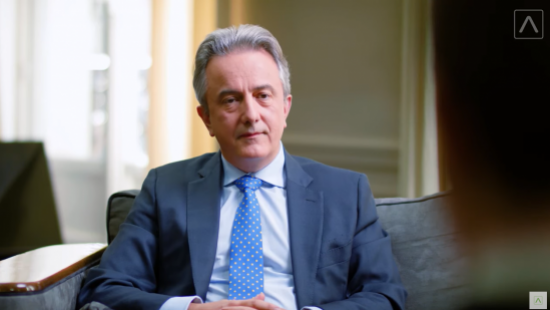
Interview with Francis Malige, EBRD Managing Director
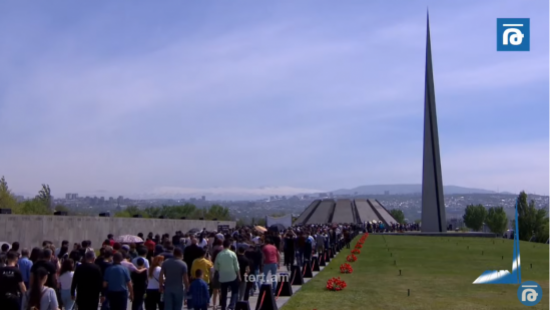
Armenians Commemorating 106th Anniversary of Genocide
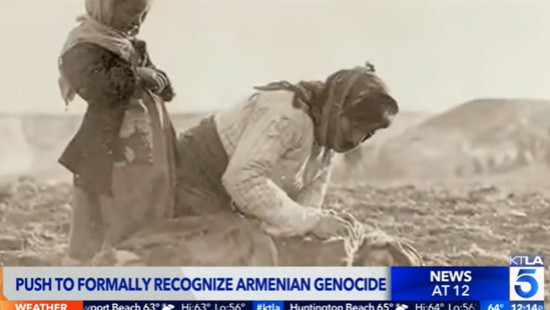
Biden Under Pressure to Recognize Armenian Genocide - KTLA 5 News
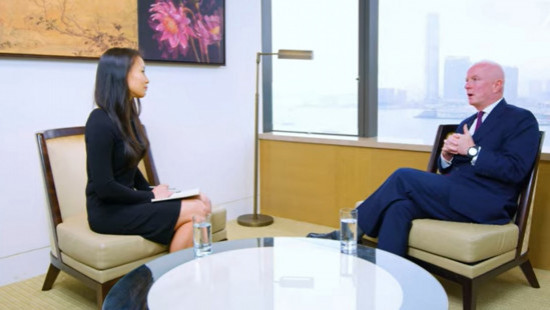
Governance and Oversight Capacities Account for Our Bank's Robust Management System - Philip Lynch, Independent Board Member at Ameriabank

'Mr. President, It Is Now in Your Power to Right Decades of Denial' - US Congressman Adam Schiff Urges Joe Biden to Recognize Armenian Genocide
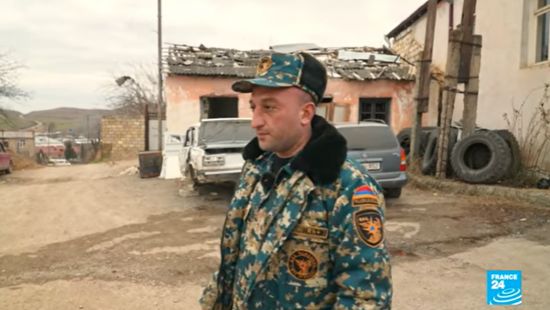
Armenians of Nagorno-Karabakh in Despair After Trauma of Military Defeat - France 24
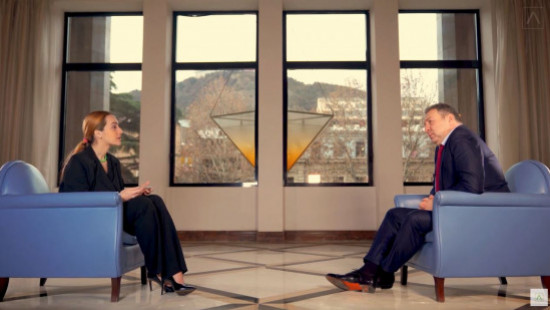
Interview with Kakhaber Kiknavelidze, an Independent Member of Ameriabank Board of Directors

Only Terrorists Keep Hostages, Putting Forward Preconditions for Their Release - Edmon Marukyan

Rep Adam Schiff Says Congress Should Recognize Artsakh
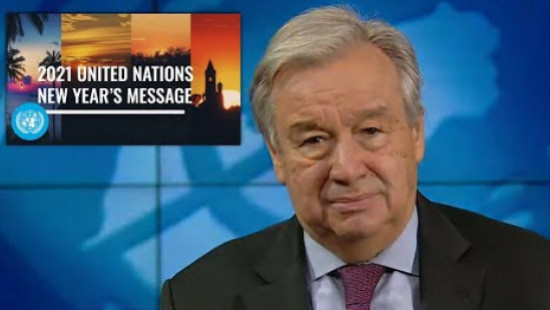
UN's Guterres Issues Global Appeal to Make 2021 'Year of Healing'

NASA's Mars 2020 Perseverance Rover Landing Animations

Azerbaijan Uses Prohibited Phosphorus Chemical Munitions - Defense Army Video

Artsakh Defense Army Units Neutralizing Azerbaijani Arms Supplies

Artsakh Defense Army Units Neutralizing Azerbaijani Drone
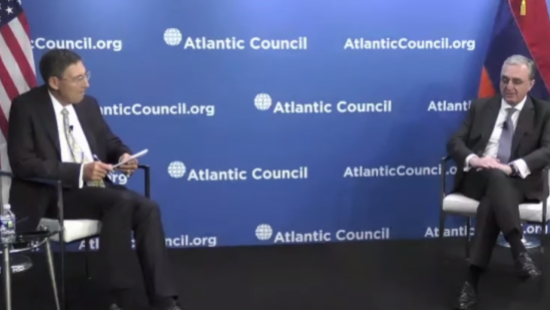
Nagorno-Karabakh's Status Has Been At the Heart of Our Approach - Zohrab Mnatsakanyan

Artsakh Defense Army Releases Video Featuring Damaged Azerbaijani Military Equipment

Artsakh Defense Army Units Inflicting Manpower Losses on Azerbaijan

Gas Pipeline Damaged in Azerbaijani Fire Targeting Nagorno-Karabakh's Capital

President Armen Sarkissian Meets Emmanuel Macron at Élysée Palace

Artsakh Defense Army Neutralizes Azerbaijani Military Hardware
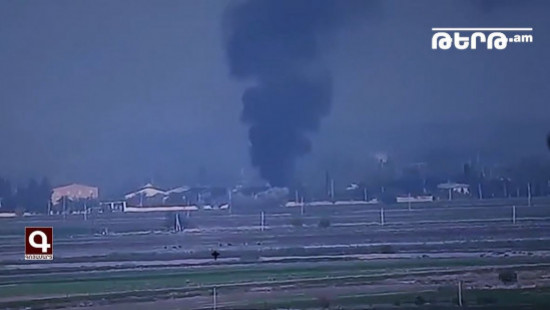
Artsakh Defense Army Units Neutralizing Azerbaijani Military Infrastructures

President Armen Sarkissian Meets with NATO Secretary-General in Brussels
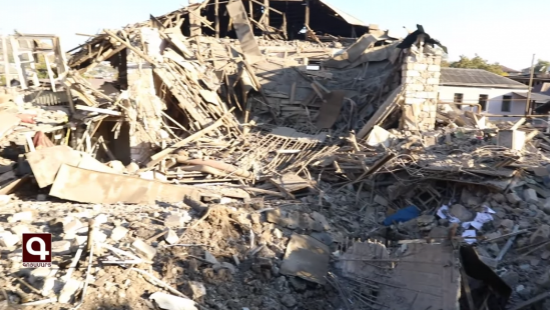
Buildings and Homes Lying in Ruins in Nagorno-Karabakh's Capital After Azerbaijani Shelling
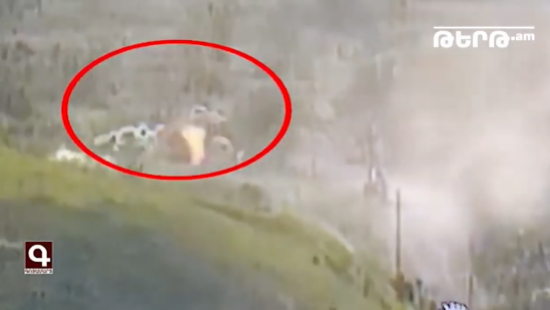
Artsakh Defense Army's Precision Fire Gives Deadly Blow to Enemy
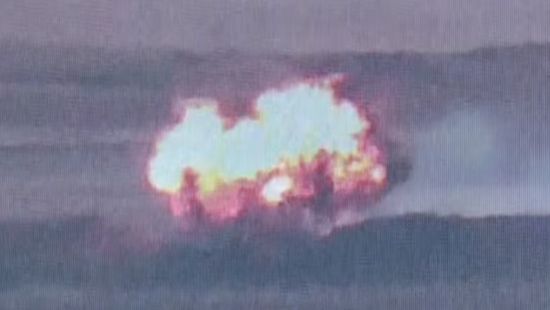
Artsakh Defense Army Units Destroying Azerbaijani Tank

Zohrab Mnatsakanyan: Ceasefire Does not Mandate Azerbaijan to Kill Civilians and Hit Civilian Settlements
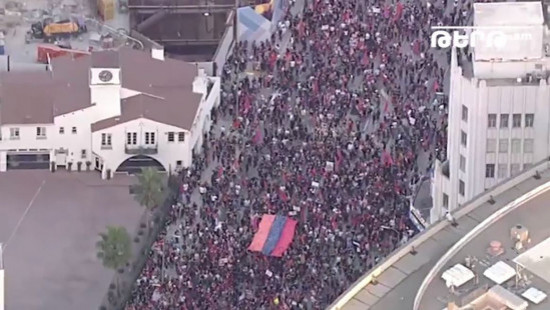
Armenians Protest Outside Turkrish Embassy in Los Angeles
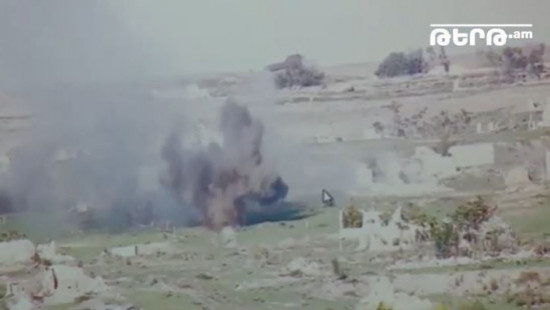
Losses in Azerbaijan's Military Featured in Defense Army Footage
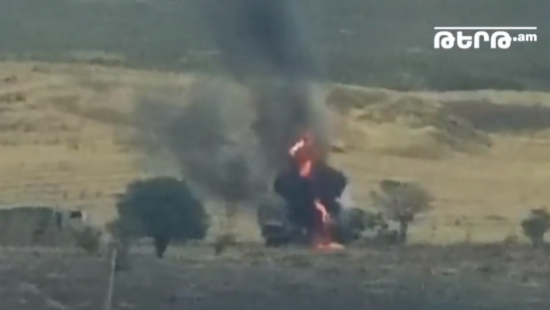
Artsakh Defense Army Neutralizing Adversary's Transport Column
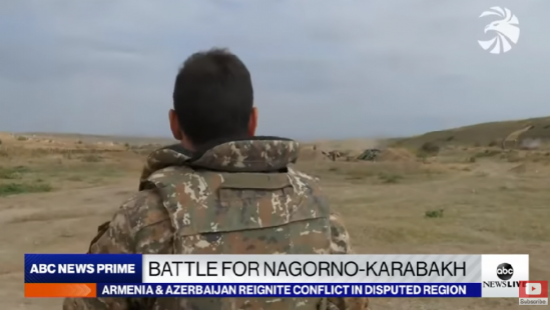
Turkey openly backs Azerbaijan 'far more aggressively than in the past' - ABC News on Syrian mercenaries fighting in Karabakh
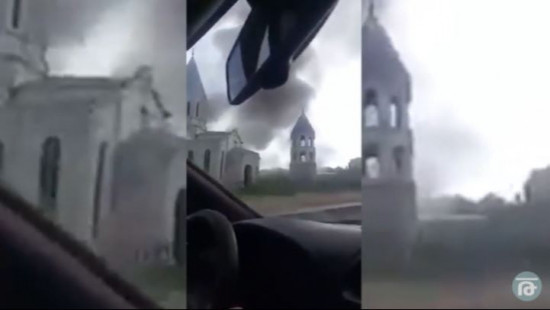
Iconic Armenian Church Hit in Azerbaijani Attacks in Nagorno-Karabakh City (photos)
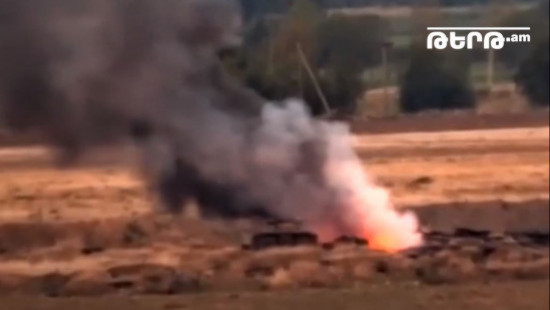
Artsakh Defense Army Continues High-Precision Strikes
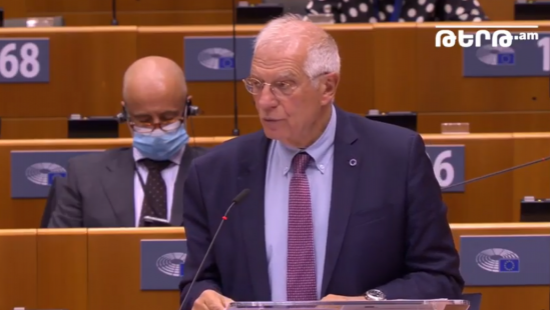
War Situation in Karabakh on European Parliament's Agenda
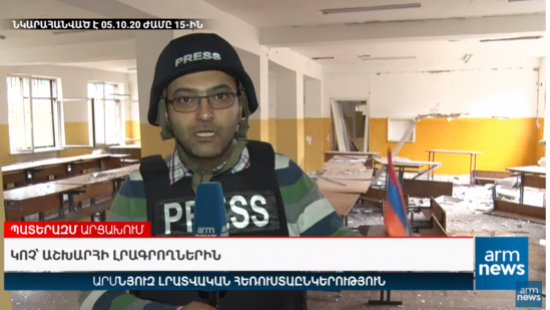
Call for Urgent Action: Armenian Journalist Brings Intn'l Colleagues' Attention to Situation iin Artsakh After Azerbaijani Attacks
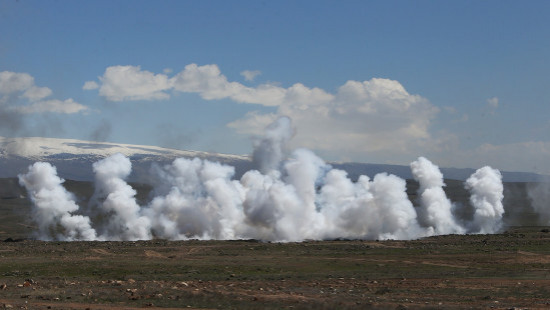
Turkey's Support to Syrian Mercenaries Fighting Against Artsakh: Facts About Azerbaijani Aggression
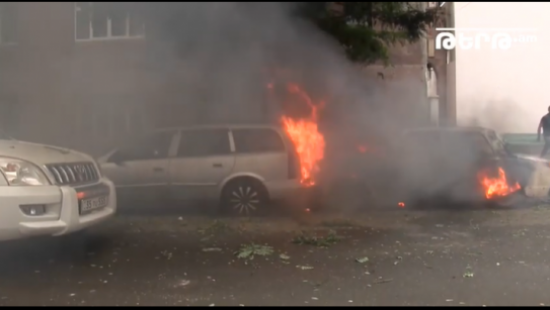
Nagorno-Karabakh's Capital Under Azerbaijani Strikes
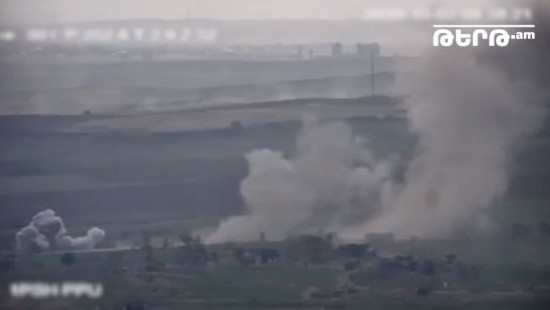
Armenian Armed Forces Neutralize Azerbaijani Defense Positions
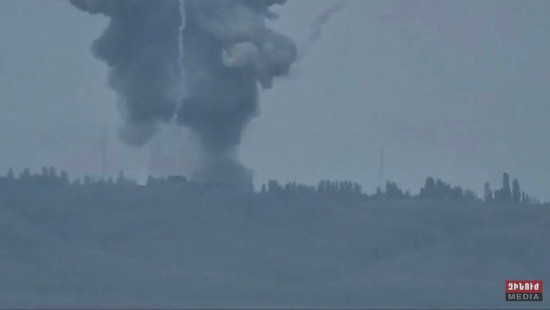
ArmenianTroops Destroy Azerbaijani Armored Fighting Vehicle on Frontline
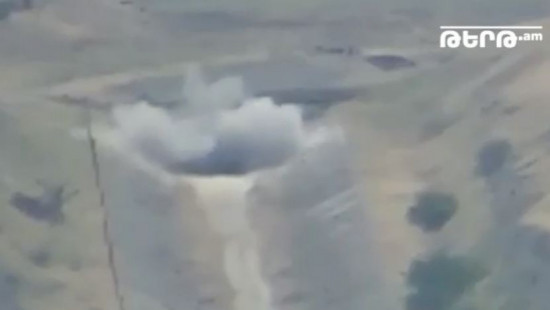
There is a solid evidence that Azerbaijan has launched a thoroughly planned attack on the NKR
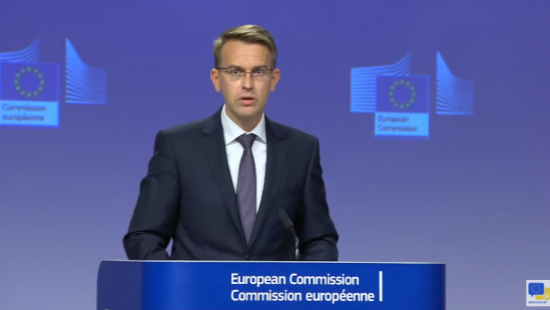
EU calls for Immediate End to Hostilities over Nagorno-Karabakh
-
 15:20 • 24.05.21
Interview with Francis Malige, EBRD Managing Director
15:20 • 24.05.21
Interview with Francis Malige, EBRD Managing Director
-
 11:39 • 24.04.21
Armenians Commemorating 106th Anniversary of Genocide
11:39 • 24.04.21
Armenians Commemorating 106th Anniversary of Genocide
-
 09:40 • 23.04.21
Biden Under Pressure to Recognize Armenian Genocide - KTLA 5 News
09:40 • 23.04.21
Biden Under Pressure to Recognize Armenian Genocide - KTLA 5 News
-
 15:34 • 22.04.21
Governance and Oversight Capacities Account for Our Bank's Robust Management System - Philip Lynch, Independent Board Member at Ameriabank
15:34 • 22.04.21
Governance and Oversight Capacities Account for Our Bank's Robust Management System - Philip Lynch, Independent Board Member at Ameriabank
-
 14:09 • 21.04.21
'Mr. President, It Is Now in Your Power to Right Decades of Denial' - US Congressman Adam Schiff Urges Joe Biden to Recognize Armenian Genocide
14:09 • 21.04.21
'Mr. President, It Is Now in Your Power to Right Decades of Denial' - US Congressman Adam Schiff Urges Joe Biden to Recognize Armenian Genocide
-
 12:37 • 03.04.21
Armenians of Nagorno-Karabakh in Despair After Trauma of Military Defeat - France 24
12:37 • 03.04.21
Armenians of Nagorno-Karabakh in Despair After Trauma of Military Defeat - France 24
-
 17:33 • 11.03.21
Interview with Kakhaber Kiknavelidze, an Independent Member of Ameriabank Board of Directors
17:33 • 11.03.21
Interview with Kakhaber Kiknavelidze, an Independent Member of Ameriabank Board of Directors
-
 17:57 • 26.01.21
Only Terrorists Keep Hostages, Putting Forward Preconditions for Their Release - Edmon Marukyan
17:57 • 26.01.21
Only Terrorists Keep Hostages, Putting Forward Preconditions for Their Release - Edmon Marukyan
-
 13:33 • 22.01.21
Rep Adam Schiff Says Congress Should Recognize Artsakh
13:33 • 22.01.21
Rep Adam Schiff Says Congress Should Recognize Artsakh
-
 09:42 • 29.12.20
UN's Guterres Issues Global Appeal to Make 2021 'Year of Healing'
09:42 • 29.12.20
UN's Guterres Issues Global Appeal to Make 2021 'Year of Healing'
-
 18:41 • 24.12.20
NASA's Mars 2020 Perseverance Rover Landing Animations
18:41 • 24.12.20
NASA's Mars 2020 Perseverance Rover Landing Animations
-
 13:33 • 31.10.20
Azerbaijan Uses Prohibited Phosphorus Chemical Munitions - Defense Army Video
13:33 • 31.10.20
Azerbaijan Uses Prohibited Phosphorus Chemical Munitions - Defense Army Video
-
 16:37 • 30.10.20
Artsakh Defense Army Units Neutralizing Azerbaijani Arms Supplies
16:37 • 30.10.20
Artsakh Defense Army Units Neutralizing Azerbaijani Arms Supplies
-
 11:25 • 28.10.20
Artsakh Defense Army Units Neutralizing Azerbaijani Drone
11:25 • 28.10.20
Artsakh Defense Army Units Neutralizing Azerbaijani Drone
-
 13:45 • 24.10.20
Nagorno-Karabakh's Status Has Been At the Heart of Our Approach - Zohrab Mnatsakanyan
13:45 • 24.10.20
Nagorno-Karabakh's Status Has Been At the Heart of Our Approach - Zohrab Mnatsakanyan
-
 11:51 • 24.10.20
Artsakh Defense Army Releases Video Featuring Damaged Azerbaijani Military Equipment
11:51 • 24.10.20
Artsakh Defense Army Releases Video Featuring Damaged Azerbaijani Military Equipment
-
 11:40 • 24.10.20
Artsakh Defense Army Units Inflicting Manpower Losses on Azerbaijan
11:40 • 24.10.20
Artsakh Defense Army Units Inflicting Manpower Losses on Azerbaijan
-
 10:39 • 24.10.20
Gas Pipeline Damaged in Azerbaijani Fire Targeting Nagorno-Karabakh's Capital
10:39 • 24.10.20
Gas Pipeline Damaged in Azerbaijani Fire Targeting Nagorno-Karabakh's Capital
-
 12:41 • 23.10.20
President Armen Sarkissian Meets Emmanuel Macron at Élysée Palace
12:41 • 23.10.20
President Armen Sarkissian Meets Emmanuel Macron at Élysée Palace
-
 12:16 • 23.10.20
Artsakh Defense Army Neutralizes Azerbaijani Military Hardware
12:16 • 23.10.20
Artsakh Defense Army Neutralizes Azerbaijani Military Hardware
-
 12:02 • 22.10.20
Artsakh Defense Army Units Neutralizing Azerbaijani Military Infrastructures
12:02 • 22.10.20
Artsakh Defense Army Units Neutralizing Azerbaijani Military Infrastructures
-
 10:35 • 22.10.20
President Armen Sarkissian Meets with NATO Secretary-General in Brussels
10:35 • 22.10.20
President Armen Sarkissian Meets with NATO Secretary-General in Brussels
-
 10:51 • 17.10.20
Buildings and Homes Lying in Ruins in Nagorno-Karabakh's Capital After Azerbaijani Shelling
10:51 • 17.10.20
Buildings and Homes Lying in Ruins in Nagorno-Karabakh's Capital After Azerbaijani Shelling
-
 15:09 • 15.10.20
Artsakh Defense Army's Precision Fire Gives Deadly Blow to Enemy
15:09 • 15.10.20
Artsakh Defense Army's Precision Fire Gives Deadly Blow to Enemy
-
 13:13 • 13.10.20
Artsakh Defense Army Units Destroying Azerbaijani Tank
13:13 • 13.10.20
Artsakh Defense Army Units Destroying Azerbaijani Tank
-
 12:56 • 12.10.20
Zohrab Mnatsakanyan: Ceasefire Does not Mandate Azerbaijan to Kill Civilians and Hit Civilian Settlements
12:56 • 12.10.20
Zohrab Mnatsakanyan: Ceasefire Does not Mandate Azerbaijan to Kill Civilians and Hit Civilian Settlements
-
 12:23 • 12.10.20
Armenians Protest Outside Turkrish Embassy in Los Angeles
12:23 • 12.10.20
Armenians Protest Outside Turkrish Embassy in Los Angeles
-
 17:23 • 09.10.20
Losses in Azerbaijan's Military Featured in Defense Army Footage
17:23 • 09.10.20
Losses in Azerbaijan's Military Featured in Defense Army Footage
-
 15:53 • 09.10.20
Artsakh Defense Army Neutralizing Adversary's Transport Column
15:53 • 09.10.20
Artsakh Defense Army Neutralizing Adversary's Transport Column
-
 14:11 • 09.10.20
Turkey openly backs Azerbaijan 'far more aggressively than in the past' - ABC News on Syrian mercenaries fighting in Karabakh
14:11 • 09.10.20
Turkey openly backs Azerbaijan 'far more aggressively than in the past' - ABC News on Syrian mercenaries fighting in Karabakh
-
 15:52 • 08.10.20
Iconic Armenian Church Hit in Azerbaijani Attacks in Nagorno-Karabakh City (photos)
15:52 • 08.10.20
Iconic Armenian Church Hit in Azerbaijani Attacks in Nagorno-Karabakh City (photos)
-
 10:57 • 08.10.20
Artsakh Defense Army Continues High-Precision Strikes
10:57 • 08.10.20
Artsakh Defense Army Continues High-Precision Strikes
-
 14:24 • 07.10.20
War Situation in Karabakh on European Parliament's Agenda
14:24 • 07.10.20
War Situation in Karabakh on European Parliament's Agenda
-
 19:31 • 05.10.20
Call for Urgent Action: Armenian Journalist Brings Intn'l Colleagues' Attention to Situation iin Artsakh After Azerbaijani Attacks
19:31 • 05.10.20
Call for Urgent Action: Armenian Journalist Brings Intn'l Colleagues' Attention to Situation iin Artsakh After Azerbaijani Attacks
-
 16:17 • 04.10.20
Turkey's Support to Syrian Mercenaries Fighting Against Artsakh: Facts About Azerbaijani Aggression
16:17 • 04.10.20
Turkey's Support to Syrian Mercenaries Fighting Against Artsakh: Facts About Azerbaijani Aggression
-
 12:39 • 04.10.20
Nagorno-Karabakh's Capital Under Azerbaijani Strikes
12:39 • 04.10.20
Nagorno-Karabakh's Capital Under Azerbaijani Strikes
-
 13:49 • 03.10.20
Armenian Armed Forces Neutralize Azerbaijani Defense Positions
13:49 • 03.10.20
Armenian Armed Forces Neutralize Azerbaijani Defense Positions
-
 10:12 • 29.09.20
ArmenianTroops Destroy Azerbaijani Armored Fighting Vehicle on Frontline
10:12 • 29.09.20
ArmenianTroops Destroy Azerbaijani Armored Fighting Vehicle on Frontline
-
 23:42 • 28.09.20
There is a solid evidence that Azerbaijan has launched a thoroughly planned attack on the NKR
23:42 • 28.09.20
There is a solid evidence that Azerbaijan has launched a thoroughly planned attack on the NKR
-
 18:45 • 28.09.20
EU calls for Immediate End to Hostilities over Nagorno-Karabakh
18:45 • 28.09.20
EU calls for Immediate End to Hostilities over Nagorno-Karabakh
Most popular articles Today Yesterday For a week
-
 Science/tech 16:55 • 18/11 The Results of the 19th Annual International Microelectronics Olympiad Summarized in Yerevan This year's Olympiad was conducted in two stages, with 332 participants from 16 countries, including the UAE, USA, Brazil, Israel, Italy, Lebanon, Armenia, Jordan, Sri Lanka, Chile, Peru, Portugal, Russia, Serbia, Vietnam, and France.
Science/tech 16:55 • 18/11 The Results of the 19th Annual International Microelectronics Olympiad Summarized in Yerevan This year's Olympiad was conducted in two stages, with 332 participants from 16 countries, including the UAE, USA, Brazil, Israel, Italy, Lebanon, Armenia, Jordan, Sri Lanka, Chile, Peru, Portugal, Russia, Serbia, Vietnam, and France. -
 Event 11:07 • 19/11 “New Career Opportunities and Perspectives”: a career fair will be organized for people of Artsakh The main goal of the event is to support the socio-economic integration of Artsakh residents displaced by the conflict into Armenian society. It aims to enhance their competitiveness in the labor market and address employment challenges.
Event 11:07 • 19/11 “New Career Opportunities and Perspectives”: a career fair will be organized for people of Artsakh The main goal of the event is to support the socio-economic integration of Artsakh residents displaced by the conflict into Armenian society. It aims to enhance their competitiveness in the labor market and address employment challenges.
Economy
-
16:51 • 11.11.24 New features for Armeconombank’s Premium cardholders
-
12:16 • 08.11.24 Ucom and Sunchild NGO install another solar plant in Areni
Event
-
14:40 • 19.11.24 Ucom’s 5G network launched in 11 new cities
Science/tech
-
14:18 • 08.05.24 AstraZeneca withdrawing Covid vaccine worldwide


